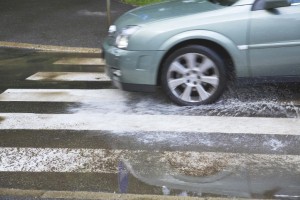UK's extreme weather 'makes tyre safety a priority'
09/01/2013 16:29
Share

UK's extreme weather 'makes tyre safety a priority'
Drivers have been urged to make more of an effort to ensure their tyres are in good working order, amid claims that the frequency of extreme weather across the UK is increasing.
TyreSafe delivered the message after two organisations associated with analysing and reporting on Britain's weather forecasts presented bleak findings from their latest research.
For one, the National Climate Information Centre, which acts as the UK's official climate record firm, produced figures which revealed that the days of particularly heavy rainfall across the country have become more common since 1960.
To further highlight how many days British citizens now have to endure extreme weather, the Met Office has recently confirmed that 2012 was the second wettest year on record.
While both of these aspects are worrying in general, Stuart Jackson, the chairman of TyreSafe, believes it should particularly send alarm bells ringing to the UK's motoring industry.
He acknowledged: "Adequate tread depth is essential for safe driving, especially in wet weather which seems to be increasingly commonplace.
"Tyres that do not have enough tread pose a significant danger to the driver, passengers and other road users, so they should be checked regularly to make sure they are safe and legal."
Picking up on this final point, motorists should always ensure that their tyre always has a minimum of 1.6mm of tread depth across the central three quarters of the tyre, around its entire circumference, in order to abide to current UK legislation.
Anyone who is found to be failing to adhere to such regulations could be faced with a fine of up to £2,500 for each illegal tyre, as well as seeing three penalty points being added to their driver's licence.
One simple way to check if a tyre's tread depth is not dipping into illegal territory is to place a 20p coin into the main grooves of the product. If the outer band of the coin can still be visible once it is inserted, then it may be that the tyre does not have sufficient depth.
While carrying out this task, TyreSafe also encourages drivers to spend a little time checking to see if the product has any cuts, lumps or bulges, as well as removing any objects which have become embedded into the tread.
Mr Johnson concluded: "If extreme weather and heavy rainfall is set to become more of an everyday occurrence, then motorists need to make sure that they are prepared for these conditions by looking after their tyres."
Posted by Sebastian Turkenburg
